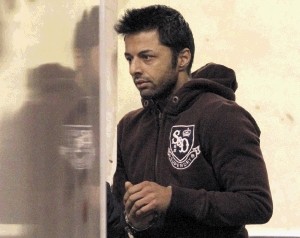|
Husband has been accused of everything, writes Lin Sampson, from being a
con man to being gay
|
 |
|
TRIAL BY MEDIA:
Shrien Dewani attends the Westminster Magistrate's Court in
London for bail proceedings Picture: ANDREW WINNING/REUTERS
|
If the
newspapers are to be believed, Shrien Dewani's life must have been off
the chains, tying up hit contracts, often in places he'd never even been
to, googling up criminal connections, keeping up with the underworld,
arranging his new wife's death within two hours of arriving in a new
country, and fitting in a beating or two by rent boys in Berlin.
He even
found time to go to Bristol Grammar School (not a place you slide easily
into) and work for Deloittes where he qualified as a chartered
accountant.
Dewani
makes the Kray twins look like real wusses. And the boy only 30 - what a
career lies ahead - Mossad, MI5, GRU.
In a
blizzard of rumour, supposition and superheated speculation, a
combination of muck rakers and police leaks, Dewani has been accused of
everything, from being a con man to being gay.
Lip-smacking hacks raked up hotel receptionists who said he had got a
cheapo (something journalists themselves are quite keen on); airline
hostesses who said his wife Anni was crying on the plane (what air
hostess? what plane?); it was reported that he walked in front of his
wife. Does this suggest murderous intention? I asked one reporter why
she thought the marriage was unhappy, she answered, "Because her feet
were swollen."
The
phrase "sources report" was used more than 200 times. I counted.
Although the South African press blamed the British press, most of the
rumour emanated from here and had a standard formula, a mitring together
of half-truths fingering Dewani and ending with a denial that he was a
suspect.
Melanie
Peters writing in the Argus was the doyenne of this type of journalism.
In an article headed "Bizarre Twists in
Anni
Killing" she wrote: "Police have information that Shrien
flew into Cape Town a week before his wife was killed. November 6th."
She goes
on to say that after their wedding, the couple spent two nights at a
game lodge on the 10th and 11th, arriving in Cape Town on the morning of
November 12.
It is
the old tabloid journalist's trick of planting an idea and then
dismissing it, to cover yourself.
Jeremy
Gordin, writing on www.politicsweb in his capacity as a journalist and
director of Wits University journalism programme which examines
miscarriages of justice no less, called Dewani a "creature".
Police
chief Bheki Cele called him a "monkey". It appears that most people
would rather hang with a self-confessed murderer crouching on a plea
bargain than go with an old legal rule: innocent until proved guilty.
One
question surfaced constantly: how did Shrien get away unscathed?
In an
effort to research this piece, I tracked through nearly a hundred hijack
stories. In one, a husband and wife were killed; in another, a baby and
father were murdered, mother left alive and a cellphone taken; in yet
another, nobody was killed and nothing was taken, not even the car. Cars
were frequently abandoned a few kilometres away.
Crime in
South Africa has no pattern. Hijackings particularly are usually botched
and bungled.
The
other refrain was: what were they doing in Gugulethu late at night? When
you are in a foreign country, you are frequently in the hands of a taxi
driver. Miles Durand, an interior decorator who visits India frequently,
says: "I give my life over to these taxi guys. They could take me
anywhere. So far I have been lucky. I am ashamed to say that I have also
exchanged money on the black market on the advice of a taxi driver."
The
Dewani case has similarities with the
Madeleine
McCann
case. It has the same tone of personal vindictiveness; unverified
stories were constantly leaked to the press by the police.
Sniffer dogs were taken to England and detected Madeleine's
bodily fluids
on Kate McCann's skirt, a garment she had worn long before
her daughter disappeared. This was enough to have them declared official
suspects.
The McCanns
were accused of being too calm; an accusation that was levelled against
Dewani. It was seen as ominous that he employed a spin doctor; the
McCanns also employed one.
So what has it done for South Africa? If Dewani is guilty, then the fact
that you can get a hit man for R1500 might attract a niche market of
people wanting to knock off someone. If he is not guilty, and so far no
substantiated fact has emerged, then our police, our journalists, our
country, have more than egg on their faces. They have blood.
|



